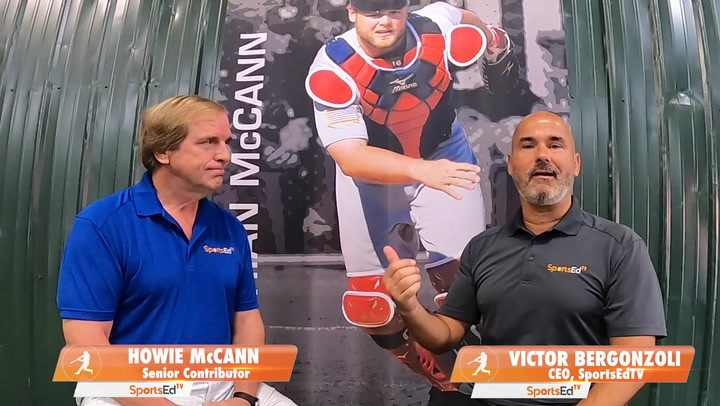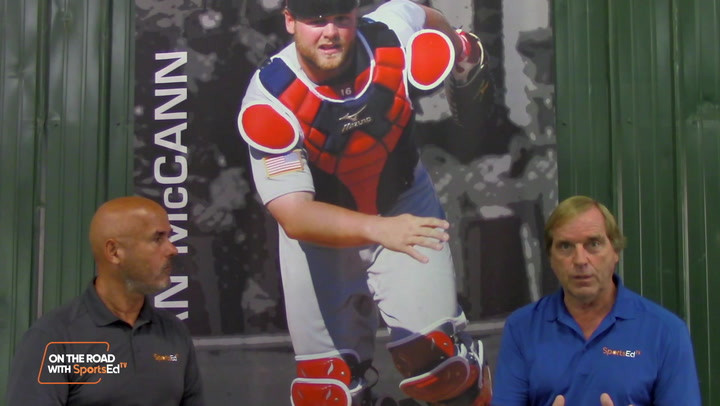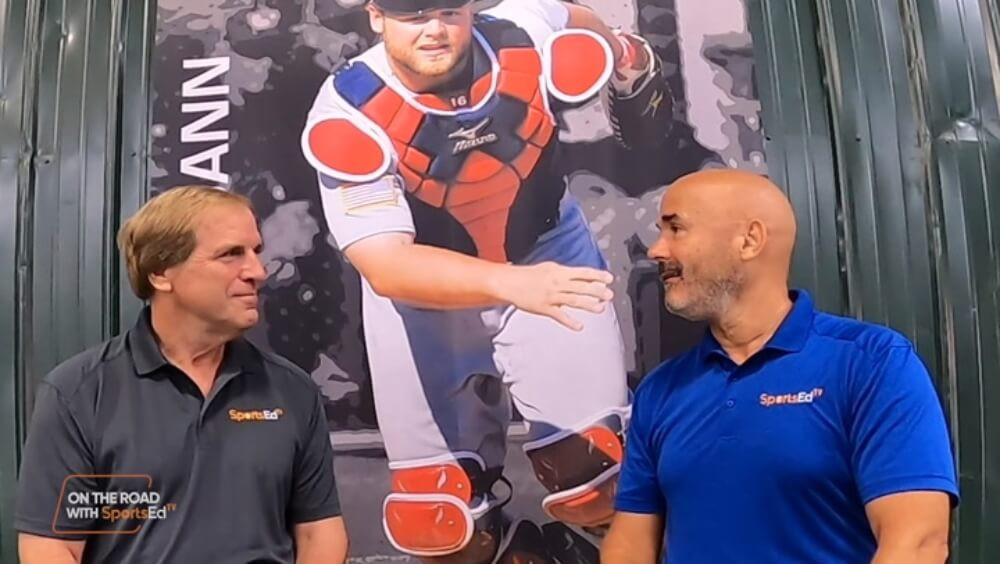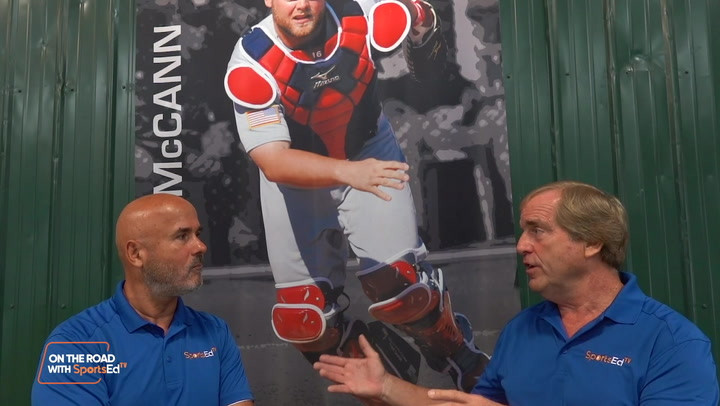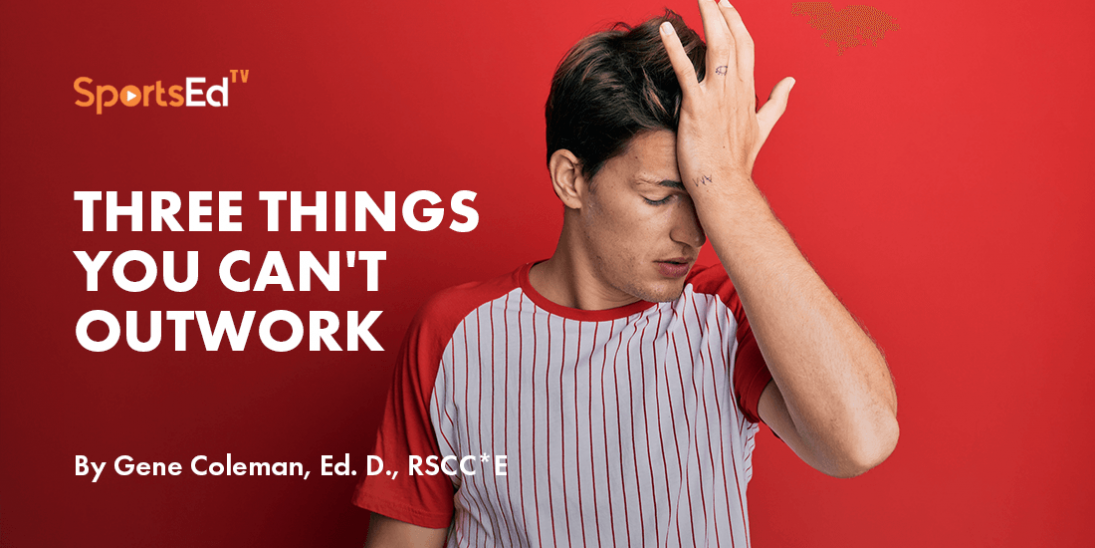Baseball
Welcome and thanks for visiting...

SportsEdTV Talks to Howie McCann
VB: Hello, this is Victor Bergonzoli, with SportsEdTV and I have a great pleasure today to have my friend, Howie McCann here. Howie has been a baseball coach forever and father of Major League Baseball player Brian McCann. We are going to have a great series of discussions with Howie over the next few weeks. Howie, welcome.
HM: Thank you so much, Victor.
VB: Tell us about you, you know, where are you from originally?
HM: Originally from Oswego, New York, New York is a boot and Buffalo is on the far west corner. If you go right along to Lake Ontario, when it starts to go north to Canada, there's a little town called Oswego. I lived on the Oswego River, which empties into Lake Ontario. So that is where I got my upbringing.
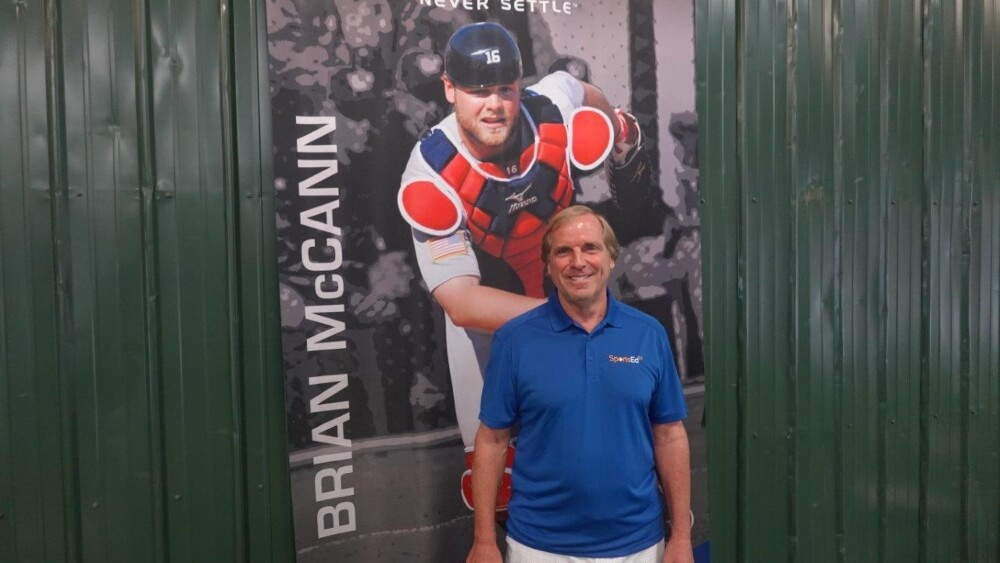
VB: Nice. And how did you come to baseball as a kid? I mean, in up State New York you can go skiing, you can do bobsleigh.
HM: My parents were very supportive, you know, baby boomers. So, all my buddies were around, and we played baseball all summer, started playing Little League, then in high school and in college and a little bit of pro ball.
VB: And were you a Yankees fan?
HM: Yes, this is the old days. But in the 60s, the Yankees came on TV only on Sundays. There was no cable television in those days. So, we got the Yankees on Sunday and then the game of the week with Curt Gowdy on Saturday. So, there is two games a week and that was it.
VB: Did you play baseball in high school?
HM: Yes. Yes, as a kid. Then we played Little League nine to 12, then Babe Ruth in our area 13 to 15 and then high school 15 to 18, then went to college, junior college a Gulf Coast community college in Panama City, which got me in Mississippi State, which got me into pro baseball one year. Good enough to play, but not good enough to move. Then I got a Masters from LSU.
VB: Nice And then you became a coach?
HM: Yes, I was a college coach for 18 years. LSU as a grad assistant. My first real job was Rollins College, a small liberal arts law school right outside of Orlando. I was there two years which got me to Georgia for seven. And then I was assistant coach at Georgia and head coach at Marshall. And then I got into this business for about twenty-one years.
VB: You have a beautiful facility here.
VB: Well, thank you. Thank you.
VB: And I mean, I have been coming here not as a baseball player, but for the past ten years. Because you use Dartfish. Good. That is a great intro. I mean, what is amazing is that you have two sons and two of them were pro players. And Brian just retired.
HM: I was very lucky. Most parents have one kid that is very good. Yeah. And the other guy does another direction, whether it is academics or music or what have you. I was lucky. Both my kids love baseball and it was a very easy transition. When I got home from work, they were ready, they were ready to play catch. And hit the ball.
VB: Well, that brings us to the topic: When do you start? You know, they are little kids, they start standing on their feet and you're like, OK, I'm going to bring them to my passion. We all want to do it right. And how did you start what age?
HM: As soon as they can pick up a bat. I call it a Fred Flintstone bat. It's a whiffle ball bat. And people my age, it was a big handle and a big old barrel, like Fred Flintstone. And I remember the kids when they were probably three when picking a whiffle ball bat up and swinging the bat. And funny story when the kids were young. When Brian was young, I got a video of him with his bat and my mother in law goes “OK here”. Hit one and you hear me in the background going "Hey grandma, you better move back a little bit" and whack it hits her on the shoulder and she starts yelling and screaming. But whatever they were young, you know, get a wiffle ball bat and have to swing it. Then as soon as they could put a glove on the bottom a glove and play catch because of skills that you learn at a very young age will follow you all the way through.
VB: So, you did that when they started when they were two or three?
HM: Oh, I'd say threeish, yeah. I mean, it's every kid's different, every kid's passion is different. But both kids and really with my kids are fourteen months apart. So, it's almost like raising twins. Yes. So, when I got home both of them were ready to, like I said, to play catch.
VB: Well they knew what Dad was doing. And so, you go home, and you go where. In the backyard?
HM: Yes. I had a nice backyard. I'm coaching in Georgia at the time. So they would come to all the games and my head coach, Coach Weber, if we won, if we won he let them run the bases and you know, the players were great to them, you know, they play catch with them. After the games and stuff like that, so they kind of grew up at the ballpark and, you know, to go see your dad and you actually watch a baseball game. Now, how much they watched; I don't know. But they were running around. Like I said, the players are really cool, they would play with them after the game.
VB: So, it's important, you know, watch the game with your sons if they play another sport.
HM: Oh, absolutely.
VB: Be involved. You know, just give them the passion.
HM: Be a dad or mom, you know. Yes. Yes. A lot of them are involved.
HM: Just like your lifestyle now, you know, you're in Miami for four days. When you get home Thursday night and you spend all weekend, you know, with your wife and your kids. You know, if you travel a bunch. In this business that I'm in now, kids get to a little bit over six, seven, eight. Then I kind of become their PE coach and their baseball coach.
VB: So, we are at the age of three to six. Do you focus only on baseball?
HM: Oh goodness, no, no, I am a real believer that other sports help your baseball and what I did with my kids was what as a kid I saw on TV. So, during football season, we threw the football. During basketball season, we shot the basketball during baseball season. We play catch and throw. And now your son's a lacrosse guy. You told me. So, lacrosse would help your baseball with foot speed and hand and all that stuff.
VB: So, do not focus too much on one sport. Play. Playtime. What if they do not want to play?
HM: No, I am one of these Victor and I tell people to come in for my lessons, they need to ask you to hit. So, you know, when you come home from work, if the two kids are sitting there going, Dad, let's go hit you. Go ahead. Now, the video games, in my era, there are no video games, but the video game air is really taken over, Fornite and all that stuff. Most parents that I know limit to X amount of minutes a day, you know. Thirty minutes, that's all you get, and we're done with. Turn that thing off. But again, I was lucky when I got home. The kids wanted to go out and play catch with football or shoot basketballs or baseballs or whatever it just be moving. I mentioned this to one at the time. You know, when I go to parties, you know, people go, oh gee, when do you start with kids? And I go, I don't know. You know, I've had five-year-old, six-year-old. And they go, well, it seems young, doesn't. And I said, no, if you thought you had the next, in my year, Billy Joel or an Elton John, as a piano player, you would certainly get your son or daughter piano lessons and the same thing here. You want to help your son or daughter be the best they can be.
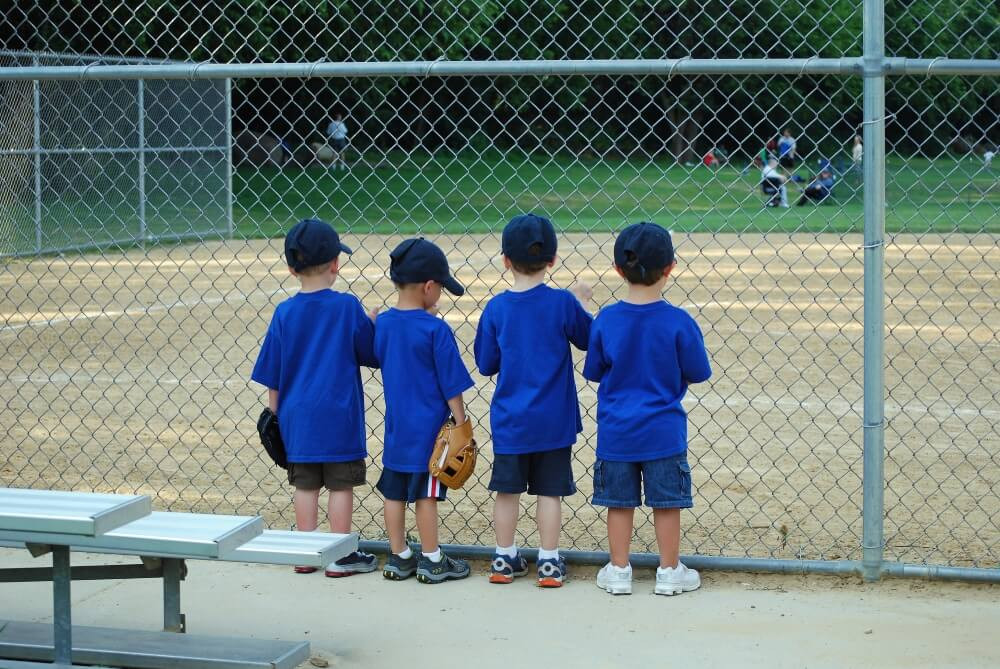
VB: You know, go outside, and play and run. And what I see, again, a lot of people making the mistake of focusing too much on one activity. And that's what happens when they are fourteen, they give up. It's very important to develop other skills.
HM: And really, your son was a big-time lacrosse player. He would have been a good baseball player, in my opinion. OK, but his love, his passion was lacrosse. So, you know, let your child what he wants to do, run with it. And again, you know, I'm a baseball guy, so I was ecstatic when the kids like baseball. But, you know, I think the big thing is to get outside and do something. My mother used to say, look, I don't care what you do, but you got to get out of the house.
VB: Very good. So, what kind of games did you do in the house as well?
HM: Oh, absolutely.
VB: Some people always complain. Where I live in a place where I don't have a big backyard. It's raining outside. It's snowing.
HW: Probably the best and the funniest thing that I did with the kids. It's football season. You know, everybody's got a couch and I've got pillows in front of the couch and I would be my knees and they would go full speed with the football and then jump. So, I catch them here on my shoulder. Well, if they broke the plane of the goal, it's a touchdown. If they did that, I'd slam them. I'd slam them into the pillows, I had pillows all over. You've got to have your son or daughter be aggressive if you're going to be anything that you do. You're a successful business guy. Why? Because you're aggressive, you're confident and you're aggressive. The same thing in any sport, you have to be confident and aggressive. So, I wanted my kids not to be afraid to slide, not to be afraid to jump, not to be afraid to, you know, to compete. And they loved that stuff. You know, they get here and I just body slam. And then the next time I catch up it, oh. And I push them into the, you know, touchdown and stuff.
They enjoyed that. I used to get to have an old shirt. Brad would hold onto my shirt, then Brian would hold on to him. And you did run around the house and you know, in ice hockey that the last guy really gets whipped. So, I whipped like this and Brian would take off. We did that through the house.
VB: Nice to build the mentality of, you know, go against the fear. These are great exercises.
HM: Are just another good one for baseball, again with the couch, because you've got pillows, you just have your son or daughter on full speed and flip them a ball. So, they're running full speed, they jump, they catch it, they land on the couch. But it teaches them, you know, in a game you got to lay out, you got to lay up. And that separates the real good ones from the OK, something like that. No fear of jumping or hopping or whatever.
VB: What about throwing the ball to you?
HM: The biggest thing is you have to be able to throw a baseball. And that's where Winward comes in and that's where the lessons come in. But you show them correctly and we'll have it on SportsEdTV exactly how to throw. But you get your grip, make sure you get a good long arm swing and make sure, I always say that the elbow is above the shoulder. If you throw like this and your forearm biceps-triceps, take the energy of your throw. If you throw sidearm and all that energy goes to your elbow and, you've heard of Tommy John's surgery, all the energy goes to here in here. So, teach your son to throw correctly and hopefully by eighteen he's ready to really go.
VB: And what is amazing is these young kids, three to six, they know how to throw because they know what hurts and they have a natural movement. You don't need to be a baseball player yourself. Just make sure it is like you would do a high five, right? That's what you said.
HM: That's it, the elbow above the shoulder. So, but if you can teach your son correctly at three, four or five, six, then by the time they're eighteen. It's just a natural movement. And that's what SportsEdTV is going to do for us. We are going to put together a collection of videos, that the fans can go to. And say, OK, plug in baseball and there's everything. Ground balls. Slide balls, swings, at-bats. Everything that we could cover will have for the fans.
VB: Perfect. Well, that was great and thank you so much.
HM: Thank you, Victor.

